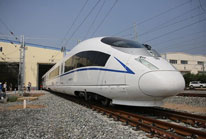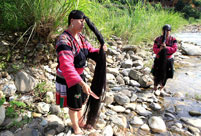

From the outside world, Tibet, the Chinese vast land symbolized by mountains and valleys is known for the Bhudist monks, especially the Potala Palace.
But there are other things that mark out Tibet you would not know until you get set for a visit.
One of them and the major factor is that Tibet is ‘bereft’ of oxygen. Like someone said after a visit and coming down with what I joked as Lhasa Fever, ‘Tibet takes your breath away.’
As you arrive in Tibet, you are advised to walk slowly and never hurry because you need to make do with the little oxygen in the environment and your system.
While you take all these cautionary steps, the natives of Tibet don’t. They don’t get exhausted and carry on like super humans. That makes you wonder if Tibet doesn’t like strangers and discriminates against them in preference for the natives. But it’s nature’s way of entraining the system over time to survive. Or you may say that the Tibetan environment already knows the natives and flows in tandem with them.
When the person taking you to Tibet requests that you see a doctor to confirm you are fit, the doubt and fear in you starts to swell and swirl. You ask again what is really peculiar about the place to the extent that you are required to sign anti-liability claim or indemnity that you willingly accepted to be in Tibet.
As you put pen to paper, you start to wonder what might be wrong or if the intent is just to cow and drive you nuts to take you out of the bargain. But on arrival at the distant land of China that is four flight hours and 10 minutes from Beijing to the western end of the country, you come to understand better the caution ahead of the trip.
Before you go to Tibet
Make up your mind to travel to Tibet by first resolving to gamble with your good health. While there, you will find out two major things – there is actually a place defined by amazing mountainous landscape, a place of lavish beauty where nature staked much resource but almost probably forgot one – oxygen that supports human life.
In Tibet, you will gasp for breath; you will palpitate with every move you make; you will learn the art of walking slowly like a 90-year-old. You need to do all these because Tibet has oxygen in very short supply and you need to conserve the one in your system if you don’t want to die of exhaustion.
Don’t forget that you would need to skip your personal hygiene of bathing until you adapt. You will learn the oft-overlooked lesson that taking your bathe is serious physical exercise that works your system so much that you may get exhausted and be thrown off balance when someone might not be there with you. Furthermore, Tibet will make your head feel like splitting in ache. You will feel nausea, throw up, some knot in your tummy, dizziness and momentary faint feat.
The reason for all these is that the quantity of oxygen your system needs to operate is inadequate and because there is not enough to supply to the brain, the neurons revolt and bombard you with aches. The joints feel weak like one that has acute malaria all because of poor oxygen supply.
Just a little after arrival in Lhasa, most of the African and Asian journalists that travelled there came down with symptoms. About four were almost permanently on oxygen while the foreign affairs office of Tibet arranged a mobile clinic with a nurse and doctor that accompanied the team everywhere. All hotel rooms in Lhasa have oxygen cylinders with emergency lines to call the hotel management in case of distress. Many during the four days trip were on drug all the time. Lhasa has a special kind of drug that boosts immunity and energy. The little sweet tasting liquid was a common companion. And every now and then, the travelers stuck out their fingers towards the nurse for blood pressure check. It was common to see one journalist quietly step aside and take a seat to catch some breathe or to throw up when the nausea mounts and the system could not take any more. The worst moments came with climbing stairs which sight made many hearts skip beats.
But after arriving Linzhi, the tension over oxygen shortage paled as the city is just 3100m high. Another travel through the old axis of the Tibet-Sichuan road through Lulang, a small mountain tourist town was a new experience. Oxygen in Lulang is ok, but the mountain route to the town is not.
 |
 World's fastest bullet train to start operating next month
World's fastest bullet train to start operating next month Huangluo: China's 'long hair village'
Huangluo: China's 'long hair village' Spectacular bridge with one of the tallest piers in the world
Spectacular bridge with one of the tallest piers in the world Magnificent view of Hukou Waterfall
Magnificent view of Hukou Waterfall A glimpse of Stride 2016 Zhurihe B military drill
A glimpse of Stride 2016 Zhurihe B military drill US Navy chief tours Liaoning aircraft carrier
US Navy chief tours Liaoning aircraft carrier Chinese American woman wins Miss Michigan
Chinese American woman wins Miss Michigan Centenarian couple takes first wedding photos
Centenarian couple takes first wedding photos Traditional Tibetan costumes presented during fashion show
Traditional Tibetan costumes presented during fashion show Top 10 livable Chinese cities
Top 10 livable Chinese cities Top 20 hottest women in the world in 2014
Top 20 hottest women in the world in 2014 Top 10 hardest languages to learn
Top 10 hardest languages to learn China’s Top 10 Unique Bridges, Highways and Roads
China’s Top 10 Unique Bridges, Highways and Roads Nation’s first Mars mission to be launched in 2020
Nation’s first Mars mission to be launched in 2020 Firms help job applicants cheat on physical examinations toavoid discrimination
Firms help job applicants cheat on physical examinations toavoid discrimination With labor costs rising, Taiwanese businesses consider leavingmainland
With labor costs rising, Taiwanese businesses consider leavingmainland Writers need scope to criticize global society
Writers need scope to criticize global societyDay|Week